Online Courses
Self-paced
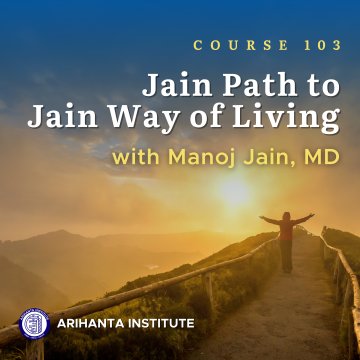
103 | Jain Path to Jain Way of Living
Added to cart
103 | Jain Path to Jain Way of Living
The course incorporates Jain core values as derived from the Tattvartha Sutra and shares Jain philosophy, principles and practices with participants.Our goal is to help people learn to live a Jain Way of Life with greater happiness and equanimity. The sessions will bring alive and simplify Jain Philosophy of Soul and Karma and Jain Principles of Ahimsa, Anekantvad, and Aparigraha using new paradigms. From these core beliefs we will connect to our modern day Jain Way of Life practices. Also, we will discuss and share Jain content with participants.
$99.00 USD
Instructor
Self-paced
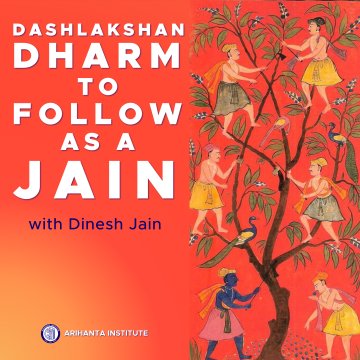
109 | Dashlakshan Dharm to Follow as a Jain
Added to cart
109 | Dashlakshan Dharm to Follow as a Jain
This course incorporates Ten Virtues that characterize Jain Faith as derived from the Tattvartha Sutras and shares basic Jain principles and practices with participants. My goal is to help people learn to be a Jain in Daily Life by possessing these characteristics that will make them peaceful and equanimous. The sessions will bring forth the explanation of these Ten Jain Virtues as propagated by the Arihantas to stop the influx of Karma and release previously accumulated Karmas peacefully by their own efforts. The explanations given will be simple, using everyday language and understanding. By understanding the principles outlined in the class, participants will become aware of Virtuous living.LEARNING OBJECTIVES:The Ten Virtues in Jain Faith – Presented in Day-to-Day contextJain Philosophy of Soul, Karma and Liberation as relevant to present lifeHow these Virtuous Practices could lead one to live a peaceful life and achieve Salvation.Greater awareness and knowledge of fundamental principles propounded in ancient scriptures relevant to modern life.Strengthen and unify our community.Make this world a better place for all life.Peaceful and Virtuous everyday life.
$99.00 USD
Instructor
Self-paced
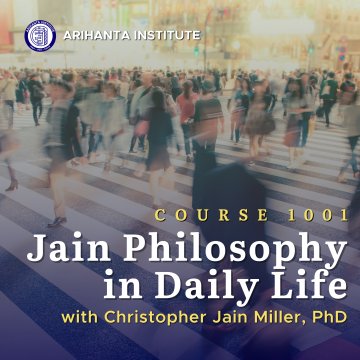
1001 | Jain Philosophy in Daily Life
Added to cart
1001 | Jain Philosophy in Daily Life
What do Jain teachings have to do with my life today? Learn how to answer this question with Jain philosophical texts that provide perennial guidance that applies to your most common everyday life situations.
$99.00 USD
Instructor
Self-paced
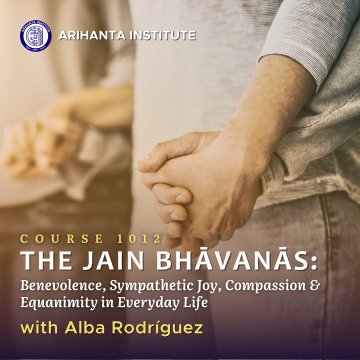
1012 | The Jain Bhāvanās: Benevolence, Sympathetic Joy, Compassion, and Equanimity in Everyday Life
Added to cart
1012 | The Jain Bhāvanās: Benevolence, Sympathetic Joy, Compassion, and Equanimity in Everyday Life
Explore the meanings, history, and practical applications of the cultivation of the Jain virtues of benevolence towards all living beings (maitrī), sympathetic joy for the virtuous (pramoda), compassion for the afflicted (kāruṇya), and equanimity towards the unvirtuous (mādhyastha). Begin by defining each term according to Jain textual sources. Next, appreciate the moral significance of these virtues and its various applications. Finally, with this conceptualization and history in mind, bring your fresh and deeper understanding of these virtues into the present and apply them in daily life. This course includes comparative study of the bhāvanās as they are interpreted and practiced in other dharma traditions. Learning Objectives:Understand the relevance of the four bhāvanās in Jain ethics and soteriology.Critically consider their context, and compare with other religious traditions.Bring your own insight of the bhāvanās into the present and apply them in daily life.
$99.00 USD
Instructor
Self-paced
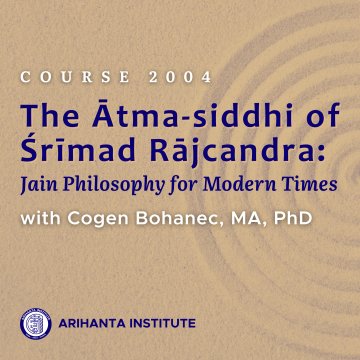
2004 | The Ātma-siddhi of Śrīmad Rājcandra: Jain Philosophy for Modern Times
This course will provide an overview of Jain Dharma based on an important text of the venerated Jain preceptor, Śrīmad Rājcandra. The trajectory of concepts covers Śrīmad’s philosophical proofs for the existence of an eternal soul as an agent, in relationship to bondage and liberation from karma. The approach of this course will be an analysis of these concepts in terms of various categories of philosophy with an inclination towards comparative religion and interfaith dialogue.
$99.00 USD
Instructor
Self-paced
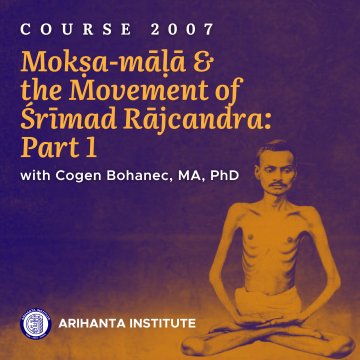
2007 | Mokṣa-māḷā & the Movement of Śrīmad Rājcandra: Part 1
Śrīmad Rājcandra (1867-1901) was an important Jain Saint of the late 19th and early 20th centuries who founded a distinct and modern, yet also in many ways quite orthodox, movement of Jainism. While Śrīmad and his followers followed many mainstream Jain teachings and practices, his teachings and the tradition that grew from them are distinct with regards to their emphasis on nonsectarianism, the ability to attain self-realization as a profound experience of one’s spiritual essence in this life or shortly thereafter, understanding of liberation as an attainable goal within 15 lifetimes, a critique of contemporary institutions of mendicancy, and the uniqueness of a bourgeoning lay movement where lay practitioners are the primary source of spiritual authority—a feature that has been widely appealing to Jain lay practitioners. The first half of this two-part course will examine how the events of Śrīmad’s life gave shape to this movement and will look at the philosophical underpinnings of Śrīmad’s tradition based on the Mokṣa-māḷā, a Gujarati text that he composed in 1887, at the age of 20, the same year that he was married, and several years before he attained self-realization and renounced worldly life. In the first half of this course, we will focus primarily on how Śrīmad’s philosophy was informed by notable events in his life, and how in turn these events and this philosophy have influenced the development of the Raj Bhakta Marg, the tradition that has developed from this important modern Jain guru. Learning Objectives:Learn the basic biographical outline of the life of Śrīmad Rajcandra.Understand the social and biographical events that led to the development of the Raj Bhakta Marga.Examine key features of the Raj Bhakta Marga that make it a unique modern Jain movement.
$99.00 USD
Instructor
Self-paced
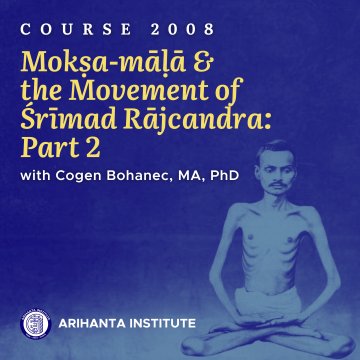
2008 | Mokṣa-māḷā & the Movement of Śrīmad Rājcandra: Part 2
As we have seen in the first half of this course, Śrīmad Rājcandra was an important Jain Saint of the late 19th and early 20th centuries who founded adistinct and modern, yet also in many ways quite orthodox, movement of Jainism known as the Raj Bhakta Marg. In the first half of this course, we focused primarily on how Śrīmad Rājcandra’s (1867-1901) philosophy was informed by notable events in his life, and how in turn these events and this philosophy have influenced the development of the Raj Bhakta Marg. In the second half of this class we will examine the features of Śrīmad’s philosophy in greater depth based primarily on the writings of the Mokṣa-māḷā (1887), but occasionally examining his Ātma-siddhi Śāstra (1896) as well. Moreover, we will examine the central concept of guru bhakti and discuss the importance of understanding Jain bhakti both within Śrīmad’s thought and tradition,but also within Jainism more broadly. We will closely examine how Śrīmad discussed various features of spiritual practice such as the importance of mantra recitation, sāmāyika and dhyāna meditation, and other practices intended to remove one’s karma and give one a direct experience of one’s spiritual essence. Finally, we will unpack the concise and elegant arguments that Śrīmad offers for the existence of an eternal soul—all discussions intended to both edify and inspire practitioners to dedicate themselves to an ardent spiritual practice where one might hope to attain self-realization and even liberation within 15 lifetimes—a significantly more attainable and immediate goal than what is often understood by many in the Jain tradition. Learning Objectives:Read and reflect on the teachings of Śrīmad’s Mokṣa-māḷā regarding themes of self-realization, bhakti, religious practices, and philosophical discourses including logical proofs for the existence of a soul.Understand the importance of Śrīmad’s emphasis of attaining self-realization and liberation, and how this relates to understanding him as a reformer or a revivalist.Examining key features of bhakti, especially guru bhakti, in the Śrīmad tradition and how this might inform a broader understanding of the importance and role of bhakti in the Jain tradition more broadly.Examine key features of religious practice advocated by Śrīmad and widely practiced by his followers including mantra recitation, sāmāyika, dhyāna, and guru-bhakti.Take time to reflect on philosophical principles of Śrīmad and applicability into daily life.Inquire into the deeper meanings and implications of the Śrīmad’s teachings in dialogue with other Jain teachings and other religious traditions.
$99.00 USD
Instructor
Enrollment Options
14-DAY FREE TRIAL
- Free, unlimited access to our self-paced courses for 14-days.
- Already used your free trial? Enroll in our Monthly or Annual Membership options at anytime and continue learning immediately!
MONTHLY MEMBERSHIP
- $45 USD / Month
-
Immediate access to course
#### | Name. - Unlimited access to our live and self-paced courses for one month, with month-to-month auto rollover.
- Excludes graduate seminars, language courses, and courses hosted on partner platforms.


 Manoj Jain, MD
Manoj Jain, MD Dinesh Jain
Dinesh Jain Christopher Miller, PhD
Christopher Miller, PhD Alba Rodriguez Juan
Alba Rodriguez Juan Cogen Bohanec, MA, PhD
Cogen Bohanec, MA, PhD